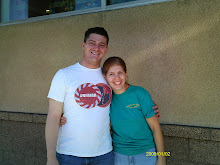The week of my arrival to Korea, Brandon and Andy took me to E-Mart after work as a way to introduce me to my new way of life. "Do you know anything about culture shock?" Andy asked as we gently rode the ramp-style escalator.
"I'm working from a theory," I proudly replied. I then described an idea I learned from my days in XTI: The first few weeks in a culture were the most relationally fruitful in terms of bonding to a new people. It was like being born: you're never more alert than in your first weeks of life. I wanted to be out among them as much as I could.
"Well that's not culture shock," he abruptly countered, deflating my rationale and betraying my ignorance. "Culture shock happens when you've been here for a couple of months. You start to notice all the little things that aren't supposed to be that way. It's this frustrating feeling that starts to get to you."
From that night on, Andy's idea has been the knowledge that I've worked from in dealing with the lifestyle by which I now find myself surrounded. I've experienced what he described several times since then: having to drink out of a paper envelope at the water cooler rather than out of a cup; being bumped into without appology at the airport, on the subway, and on the bus; and having to deal with having a bathroom inside my shower instead of a shower inside my bathroom. I quite agree with Andy's assessment, but I want to add to it. For me, culture shock didn't develop after merely two months. Small irritants like the ones above may have then surfaced, but the concept as a whole didn't fully materialize in my mind until much later. I confessed a couple of weeks ago on Facebook that "after seven months," it had "finally, irrevocably set in."
I feel the shock in many ways, most notably at work. The day I wrote my Facebook assessment, I had just confronted an English writing textbook--published in Korea and from which I am supposed to teach--that described the purpose of possessive adjectives (my, your, his, her, etc.), quaintly labeled "special words," as "relating something to someone." The book couldn't tell my eight-year-olds that these "special words" show ownership?! It didn't even use "possessive," "adjective," or "pronoun" in its description of them. I feel our writing book of choice is too simplistic to be of use to my students' English education. In a roundabout way, I suppose the book is right. But my current frustration with its methodology lies in the knowledge that there are more accurate ways to describe English grammar concepts, even to children--ones based less on hearsay and more on conventions of language and peer review.
Sometimes, however, the shock is positive and opens up opportunities to learn from the culture around me instead of just to shake my head at it. Over this summer, for example, I've been able to see Korean children's games at their finest, played among my kinder students during such activities like "Pajama Day" and our field trip to picnic in the park. American games squeeze themselves in there, too. These games are always "Koreanized," though, with an element or two no Westerner would have thought of. For Pajama Day, we played "Pin the Tail on the Elephant," as we were fresh out of donkeys without tails. Instead of leaving him to feel his way around, teachers clapped for the blindfolded student to "lead" him to the target. On our field trip to the park, we played "Musical Groups," a game similar in nature to Musical Chairs except that participating contestants don't sit down.
Today, Wednesday, May 26, we had a game for our monthly birthday party mirrored on a concept I've seen in the US. The object was to fold a sheet of newspaper smaller and smaller while still being able to fit each member of the team on top of it. I assumed that the game would play out like Musical Chairs: The contestant who found no more room to stand on the newspaper would be "out." As the situation progressed, I found there to be no such concept present. Instead, the rule was created to use whatever means--climbing on another's back, having a teacher squeeze you in--to keep every member on the square, no matter how small it got. If somehow that wasn't possible, the team as a whole was out. I lost faith in the idea by the middle of the game and wished so much to have it over. But as I began to think about it, the approach to such an activity seemed to reflect a cultural perception from the Korean worldview--the idea that it's taboo to do anything alone.
Simon Winchester, in his book Korea: A Walk Through the Land of Miracles, first introduced me to the concept of not doing things alone. He encountered it time and again in 1985 as he ventured to cross the peninsula on foot by himself. People literally thought he was insane and unhealthy. As I thought about the newspaper game and Winchester's comments, I discovered this was a game of cooperation rather than exclusion. Where the focus in America is highly centered on the individual, here the communal group is spotlighted and prized. We played another game that day which illustrated this same thought: Students lined up four at a time to tun to the end of the foyer and try, without using their hands, to eat crackers dangling from a string. In America, I mused, schoolchildren would have turned that into a relay race in a heartbeat! I thought it rather fitting and natural that, even in play, such a concept could be so exalted as to alter the rules of a game--and create whole new ones--just to preserve it.

No comments:
Post a Comment